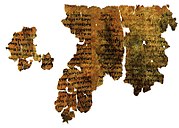This article needs additional citations for verification. (July 2024) |
| Jewish mysticism |
|---|
 |
| History of Jewish mysticism |
| Part of a series on |
| Kabbalah |
|---|
 |
The history of Jewish mysticism encompasses various forms of esoteric and spiritual practices aimed at understanding the divine and the hidden aspects of existence. This mystical tradition has evolved significantly over millennia, influencing and being influenced by different historical, cultural, and religious contexts. Among the most prominent forms of Jewish mysticism is Kabbalah, which emerged in the 12th century and has since become a central component of Jewish mystical thought. Other notable early forms include prophetic and apocalyptic mysticism, which are evident in biblical and post-biblical texts.
The roots of Jewish mysticism can be traced back to the biblical era, with prophetic figures such as Elijah and Ezekiel experiencing divine visions and encounters. This tradition continued into the apocalyptic period, where texts like 1 Enoch and the Book of Daniel introduced complex angelology and eschatological themes. The Heikhalot and Merkavah literature, dating from the 2nd century to the early medieval period, further developed these mystical themes, focusing on visionary ascents to the heavenly palaces and the divine chariot.
The medieval period saw the formalization of Kabbalah, particularly in Southern France and Spain. Foundational texts such as the Bahir and the Zohar were composed during this time, laying the groundwork for later developments. The Kabbalistic teachings of this era delved deeply into the nature of the divine, the structure of the universe, and the process of creation. Notable Kabbalists like Moses de León played crucial roles in disseminating these teachings, which were characterized by their profound symbolic and allegorical interpretations of the Torah.
In the early modern period, Lurianic Kabbalah, founded by Isaac Luria in the 16th century, introduced new metaphysical concepts such as Tzimtzum (divine contraction) and Tikkun (cosmic repair), which have had a lasting impact on Jewish thought. The 18th century saw the rise of Hasidism, a movement that integrated Kabbalistic ideas into a popular, revivalist context, emphasizing personal mystical experience and the presence of the divine in everyday life. Today, the academic study of Jewish mysticism, pioneered by scholars like Gershom Scholem, continues to explore its historical, textual, and philosophical dimensions.
© MMXXIII Rich X Search. We shall prevail. All rights reserved. Rich X Search
